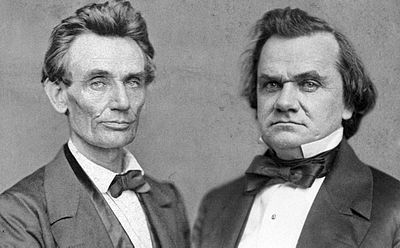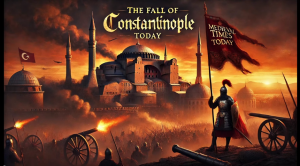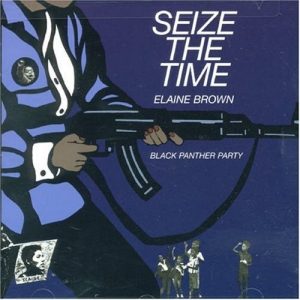The year was 1858, and the day was August 21 in the city of Ottawa, Illinois. It was dusty and hot, and there were about 12,000 people waiting in the audience around a speaking stand for a train to come in from the nearby city of Morris. The people were waiting for the arrival of Abraham Lincoln. Stephen Douglas had already arrived, and he was accompanied by a number of people as he made his way towards the speaking stand. These two men drew a very large crowd, because they were about to debate each other on issues of great national importance. The debate that was to take place this day was the first of a series of seven debates that would go down in history as “The Lincoln-Douglas Debates of 1858.” Abraham Lincoln would become President two years after these debates, in the Election of 1860. But he was not running for President in 1858. He was challenging the sitting Senator of Illinois for his Senate seat. And Stephen A. Douglas was that United States Senator.
The format for these debates was for the first speaker to give an opening speech for an hour, then the second person was to speak for ninety-minutes, and then the first speaker was to make his closing remarks for half an hour. That first debate in Ottawa was very important, as it was the first of its kind. But the Ottawa debate was something of a trial run for Lincoln, rather than an actual debate. Lincoln did not end up delivering his arguments effectively in Ottawa, which resulted in Douglas dominating the debate. And the topics that were brought up there were not discussed by Lincoln in depth. But by the time Lincoln got to the fifth debate, in Galesburg, we find Lincoln there in his finest form. Lincoln turned the tide of the debates in his favor, and he gained significant momentum for the rest of his campaign.

That fifth debate in Galesburg took place on October 7, and was held at Knox College. It was a windy and rainy day. The platform where Lincoln and Douglas were supposed to make their speeches was too high for either of them to reach through ordinary means, so they both had to climb through one of the windows in the College and then descend from a ladder to reach the speaking stand. Douglas opened his speech by making known his opposition to the Lecompton Constitution, which was the proposed Kansas state constitution of 1857, which was backed by the pro-slavery supporters in Kansas. This constitution proposed that slavery should be permitted, while free blacks should be excluded from living in Kansas.1 It is interesting to note that Douglas sided with the Republicans on this issue, instead of siding with fellow Democrats, such as President James Buchanan. Douglas brought up the topic of the Republican Party, and he asked Lincoln if the Republican Party was trying to destroy the political foundation of the United States.2 He went on to say that the Republican Party did not proclaim its principles in the North nor in the South. He accused Lincoln especially for giving different speeches to different audiences. Douglas claimed that Lincoln altered his views at different debates to appeal to various audiences.3 If Douglas was seen as correct on that matter, he might sway people who were inclined to vote for Lincoln to vote for him instead. Douglas continued his speech by stating that the Declaration of Independence was solely intended for white people in reference to the section in the Declaration where it stated that “all men are created equal.” Douglas believed that it was heretical to claim that the Declaration of Independence was intended for all people.

Lincoln’s response was that nobody before Douglas had claimed that the Declaration of Independence was only intended for white people. Lincoln thought that it was interesting that Douglas was interpreting the Declaration of Independence in the manner that he did, because he believed that black people had no rights and they should never gain any rights. The Declaration of Independence did not explicitly condemn slavery nor mention it, but Lincoln brought up a very convincing point regarding the institute of slavery and how Douglas was interpreting the document incorrectly. Lincoln said that Thomas Jefferson owned slaves but trembled at the thought of God’s justice on the matter of slavery.4
Lincoln then came back to a subject he had mentioned in a previous debate: The Dred Scott Decision of 1857. That was the legal case where the Supreme Court of the United States ruled 7-2 in the decision that Dred Scott, as a black man of slave ancestors, was not a United States citizen, and therefore had no right to sue in a federal court of law for anything, let alone his freedom. It also stipulated that the federal government did not have the power to regulate slavery in the western territories, overturning the Missouri Compromise law of 1820.5 The Dred Scott decision was a bombshell in the political landscape, and Lincoln weighed in on its implications for the future. Lincoln was against this decision because he believed that blacks had the same basic freedoms and rights as whites. But the Dred Scott decision affected all African Americans, whether slave or free, by denying them citizenship, and thereby denying them Constitutional rights. It was in this debate that Lincoln was able to turn the tide of the debates in his favor through his rhetoric.
Stephen Douglas, in his rejoinder, stayed adamant on the notion that Lincoln tailored his speeches to fit a certain audience to garner votes. To illustrate this, Douglas claimed that Lincoln said that blacks were the inferior race to whites at the Charleston debate. Douglas demanded that Lincoln be consistent in his views on slavery and black people. Douglas addressed the matter of the Dred Scott decision, but he only said this regarding the decision: “… that decision would carry slavery into free states, notwithstanding that the decision says directly the opposite.”6 Douglas said this, because he claimed that Lincoln’s interpretation of the Dred Scott decision was incorrect. Lincoln had claimed, as early as his speech in Springfield in June, that the effect of the Dred Scott decision was to turn all states into potential slave states; that slave owners, like Dred Scott’s owner, could take their slaves by the thousands into free states, just as Dred Scott’s owner had, and that those slaves would still be slaves of their owners, even though living in a so-called free state. Douglas limited himself to the above quote regarding his views on the Dred Scott decision, because he did not want there to be controversy among his supporters, because he supported both popular sovereignty and the Dred Scott decision. Popular sovereignty was the doctrine that Douglas had championed earlier in the famous Kansas-Nebraska Act of 1854, where he lured Southern votes to his cause by enabling territories like Kansas to decide for themselves whether to allow slavery in their future state, regardless of whether that territory was above the sacred Missouri Compromise line or not. But popular sovereignty and the Dred Scott decision do not go hand in hand, because they both contradict one another. The Dred Scott decision made clear that a slave could be brought to any state as property, regardless of that state’s popular sovereignty choice. A state that made the decision by popular sovereignty to be a free state was nevertheless bound to admit slavery into its state because of the Dred Scott decision. Douglas put himself in a bind by supporting both of these ideas, because they are not compatible. This is the very reason why Douglas did not discuss the Dred Scott decision in further depth, due to his miscalculation. Douglas went on to claim that Lincoln was going to appeal to the Supreme Court to repeal the Dred Scott decision.7 It seemed as though Lincoln had caught Douglas off guard in this debate, and Lincoln accomplished his goal of swinging the momentum of the debates in his favor. Lincoln needed to do well in this debate in particular, because he did not want Douglas to dominate the debates, and catching Douglas off guard was one of the best outcomes possible for Lincoln here in Galesburg. Douglas, for the most part, repeated many of the topics stated in his opening speech, which showed that he did not have substantial answers to Lincoln’s questions.

The Lincoln-Douglas debates were one of the most influential and famous debates in American history. It was these debates that laid the groundwork for the way debates would be performed in the future. After these debates, these men continued to give speeches in various cities, and they continued campaigning until it was time for the election. The election results, as determined by the legislature, gave Stephen Douglas the victory at 54 votes in his favor as opposed to the 46 votes that Lincoln amassed. Although Lincoln lost this election, he gained much notoriety from his campaign against Douglas, so much so that he was eventually nominated as the Republican Party’s candidate for the Presidential election of 1860. Douglas also secured his nomination for the Democratic Party in the Presidential election of 1860, partly because of the stands he made against Lincoln in these debates. The tables would be turned on Douglas in a matter of two years, as Lincoln defeated Douglas and other prominent politicians in that eventful Presidential Election of 1860. Given that outcome, it begs the question of who really won the Lincoln and Douglas debates. Stephen Douglas may have won his reelection in 1858, but he effectively split the Democratic Party in doing so. Although Lincoln did not become a senator, he set himself up for success as the future President of the United States.
- Robert McNamara, “Lecompton Constitution,” ThoughtCo., February 24, 2018, https://www.thoughtco.com/lecompton-constitution-1773330. ↵
- Allen Johnson, Stephen A. Douglas: A Study in American Politics (New York: The Macmillan Company, 1908), 383. ↵
- Paul Angle, Created Equal? The Complete Lincoln-Douglas Debates of 1858 (Chicago: The Chicago Historical Society, 1958), 292. ↵
- Allen Guelzo, Lincoln’s Emancipation Proclamation (New York: Simon and Schuster, 2004), 22. ↵
- James McPherson, Abraham Lincoln and the Second American Revolution (New York: Oxford University Press, 1991), 48. Dred Scott had sued for his freedom, because his master had freely brought him to Illinois for a time in the 1830s. Illinois was, of course, a free state. Much later, in the late 1840s, Dred Scott sued for his freedom on the basis that he had lived in that free state for a certain amount of time, which, he believed, entitled him to his freedom. Dred Scott’s original master, John Emerson, had died, and Scott then belonged to Emerson’s wife. ↵
- Paul Angle, Created Equal? The Complete Lincoln-Douglas Debates of 1858 (Chicago: The Chicago Historical Society, 1958), 319. ↵
- Kenneth Winkle, Lincoln’s Citadel (New York: W. W. Norton and Company, 2013), 62. ↵



91 comments
Guadalupe Altamira
Great article! I really enjoyed reading this and the details on the debates were very helpful. Learning from two different perspectives and choosing which one you go with really brings you to the time of people who were watching these debates in real-time. Its topics were very interesting and I liked how you told the topics and what they thought about them. Overall great article!
Emily Rodriguez
First of all, you did a great job at opening up the scene, it was very descriptive and immediately made me begin to picture what I was reading. This was a very interesting topic to write about and I think you truly brought this situation to life. I never had heard about the platform being too high, causing them to climb through one of the windows of the college and then descend a ladder; That made me laugh. Nice and descriptive article.
Mateo Ortega-Rios
I enjoyed this article very much, it was not a article that was very lengthy but with the amount that was given to us there was a very good amount of information for us. The Lincoln vs Douglas debates were very in depth and detailed. I learned multiple stuff I did not know at all before reading this article. The word usage in this article was able to boost my understanding and gave me a very appealing read.
Kenneth Cruz
I like how at the beginning you set the scene vividly for the reader. Lincoln may have skewed his views a bit to appeal to certain audiences. However, that tactic ended up working in his favor. I think you did a great job describing these historic debates and addressing the issues with them. It also gives us some insight into the debate system at the time.
Jackie Velasquez
This article was well written as it talked about all the controversy and explains both sides of the parties. Including both sides of the parties gives us an idea of what each person was going for and is not one sided so we can hear all aspect of this debate. I enjoyed reading this article and enjoyed how it came together by mentioned the winner and how the other person was viewed by the people based off his views.
Helena Griffith
The Lincoln-Douglass debates were described in a very detailed way that effectively revealed the debate process as a whole. Lincoln had to ensure any form of success because he was the underdog in the election, which made the political strategy employed interesting. It was clever of him to leverage the Dred Scott case from 1857 to provide a political foundation for his ultimately successful presidential run.
this article ties into what we are learning in class today but does not tie into modern living.
This is an excellently written and fascinating piece. Luke. Abraham Lincoln’s views on slavery in the United States are well known to me, but I was unaware of Stephen Douglas’s position on the subject. It was fascinating to read about their arguments and the specifics of what was said during their vocal conflicts. Additionally, the essay included excellent word choice and visuals that really stood out.
Rafael Portillo
I would like to start off by saying what a great article. We are currently learning about this in class and this reading made my understanding much better. Lincoln was known as a man who had various views when in a debate. Douglas was right to say the Lincoln always changed his views according to his audience. However it turned out to be helpful for him because he gained the people during his second time running for President.
Eugenio Gonzalez
A compelling narrative that keeps you reading to find out what happened with the outcome of the election. The author does an excellent job of presenting the scenario and giving us an idea of people’s experiences in the debates. The author also does a great job of using images that brings the reading to life and give us an idea of how the debates look.
Rodney Jones
I love how clearly the article discusses the controversy. How it demonstrates both Douglas’s and Lincoln’s points of view to avoid being biased providing specific examples and evidence to back each argument. Additionally, it tells us how Douglas fared in the end and how Lincoln was seen.
Dylan Vargas
I like how the article explains the debate in a way that we can understand. How it shows off both Douglas’s and Lincoln’s arguments so it is not one-sided. Showing the effects of each argument and giving concrete support for each one. Also gives us the end result of how Douglas won and lincoln was viewed. It definitely a major topic that should be talked about more when regarding the American Civil War.